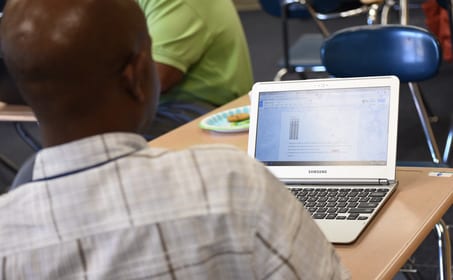Louisburg, N. C. – Earlier this month, Franklin County School officials received word that the district was awarded a $192,000 technology grant from the Golden LEAF foundation. The grant will build on the district’s current technology initiatives by providing additional Google Chromebooks, compact web-based laptops, for high school students during the 2017-18 school year.
At the County School Board’s April meeting, Superintendent Dr. Pascal Mubenga commended Dr. Rhonda Schuhler, Associate Superintendent, and the team who worked on this project, saying that technology skills are a big part of the District’s strategic plan.
“In order to be competitive, our students need to have access to technology so that they can gain the skills they need to be successful in school and beyond,” Mubenga said, adding “Thank you to Dr. Schuhler and our team that worked diligently on this proposal – we’re excited to continue to work towards a one to one initiative in our district.”
The grant will allow the district to purchase 700 Lenovo Chromebooks and 28 Laptop Management Carts in total. Devices and carts will be distributed using a formula that takes each high school’s enrollment into consideration to ensure that devices are distributed equitably based on student population.
As the largest high school in the district, Franklinton High School will receive 11 management carts housing 308 devices. Bunn High School will receive 252 devices and nine management carts; Louisburg High School will receive 168 devices and six management carts. Franklin County Early College High School, which houses just 185 students, will receive 56 devices and two management carts.
According to Schuhler, even though the grant will be used to purchase devices, the project, which is entitled T3 – Technology, Teaching, and Transformation, is focused on student achievement.
“The scope and impact of the T3 project is directly focused on increasing student proficiency in core content areas, increasing digital skills and competencies, and creating more well-rounded, competitive students,” says Schuhler. “Our hope is to use this experience to better prepare for the implementation of a complete one to one initiative across the district,” she added.
